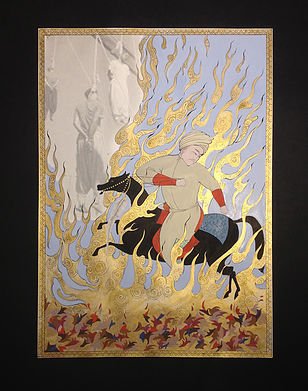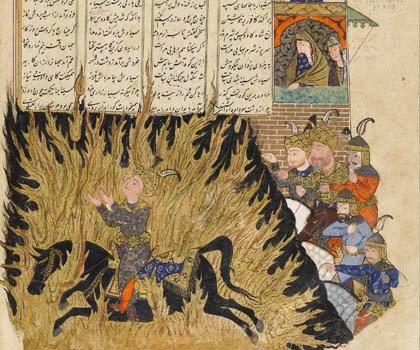Join Tessa Gratton and me as we read the Shahnameh by Abolqasem Ferdowsi. We’re using the Dick Davis translation (Penguin Classics).
Today’s portion: The Legend of Seyavash (first of three parts, this part one ending on page 237)
Synopsis: Kavas’s wife Sudabeh plots against Kavas’s son Seyavash because Seyavash refuses her advances. After being proved innocent, Seyavash leads the Persian army against Afrasyab, but a dream convinces the Turkish king to sue for peace.
KE: Wow. This is a complex and fascinating story, possibly my favorite thing so far. It seems to be told out of chronology; that is, I would suggest it is set before or during Sohrab’s childhood, because so far it never refers to the incident of Rostam killing Sohrab even though Rostam essentially acts as Seyavash’s foster father. I am assuming that fostering out a son in this way, even a royal prince, was a fairly common occurrence and thus would not have to be explained to the audience.
The other thing that makes me believe this story is out of sequence is Sudabeh’s apparent age. The Turkish girl could easily have come to Kavus’s attention before his marriage to Sudabeh. The opening sequence, in which Sudabeh falls in love (in lust) with Seyavash, seems to take place not too long after Kavus and Sudabeh have married. That they have young children is referenced, and she pretends to be pregnant at one point. So I would assume this takes place not more than 10 or so years after the marriage of Kavus and Sudabeh. Since she could have been anywhere from 14 – 20 (rough estimate) at the age of marriage, she could certainly be under 30, so it isn’t all that far-fetched for her to still be young and beautiful (by our standards) and thus likely to fall for the teenaged (and precociously mature) Seyavash.
This is the most interesting character study so far. First of all, Seyavash is no fool, despite his youth. He is described as having all the skills and virtues required of princes, and at the same time he is clearly a thoughtful, intelligent youth. He is cautious; he understands the danger he is in; he thinks things through rather than acting or speaking impulsively. This story is, so far, not kind to women: Sudabeh has no particular motive. She seems simply to have fallen for the young man in a clearly inappropriate sexual way and is determined to seduce him or destroy him. Seyavah’s Turkish mother is never named, the way the men see her as an object they can claim is rather unpleasant, and after she gives birth and Seyavash enters the story she has been (so far) not referenced again at all. She is apparently not present in the Kavus’s women’s quarters. Why? What happened to her? Seyavash’s sisters are referenced, although not by name, and they at least seem to be polite, kindly girls that he doesn’t mind hanging out with.
But what interests me most is the detailed characterization of Kavus, as his emotions drag him in one direction and then back again. So far (again, we’re only a third of the way in) he originally does not misunderstand what is going on, although from prior knowledge of him we might expect him to immediately show bad judgement. He sees what Sudabeh is up to, and yet he does care for her. I loved the brief mention of how, when he was a prisoner of Hamaveran, she “ministered to him day and night.” There’s an emotional verisimilitude to the reference that “the memory tormented him” that makes it more understandable he would keep gravitating back to her even though she has by now been revealed to have an “evil nature.” And of course his love for her begins to erode his better judgement about the clearly superior Seyavash, not that he ever really had good judgement.
I note that, once again, Kavus’s courtiers have no problem insulting him in private as when Rostam says (to Seyavash), “Kavus is as he always was.” One really need say no more.
I was glad to see that Zal is still alive (although again this tale may occur before Sohrab), and I note a second reference to Rostam’s brother Zavareh, so I am happy that Zal and Rudabeh had a second child who lives close by them (assuming Zavareh is Rostam’s full brother).
Afrasyab is back with an ill-omened dream and a lot of anxiety. Seyavash is negotiating with his own grandfather with apparently no knowledge that Garsivaz IS his grandfather. And I can hardly wait to find out what happens next since I am pretty sure it is building up to be a disaster of epic proportions.
TE: This is so complex! The most incredible thing for was that that for about three paragraphs I almost liked Kavus. I was disappointed by the prominent placement of what amounts to a false rape accusation, but Kavas’s response to the conflict between his wife and son engaged me with one of my least favorite plot devises Of All Time. Who knew this usually tempermental and frankly stupid king had it in him to measure his emotions, memories, and thoughts so well and come up with a (relatively) balanced solution. This is the guy who eventually builds a flying car to reach the sun! Being nuanced and practical!
I was fascinated by the fire trial. It’s a familiar sort of magical trial, and on one hand I loved that the actual villain/witch in this situation survived by her wiles, and the innocent party bravely pressed on through the fire. It makes me want to write a fire trial someday, and I think this is the first time I’ve been directly, specifically inspired, instead of generally interested in and inspired, by the Shahnehmah.
I, too, am delighted Zal is still alive, and also that Sudabeh accused Seyavash of using Zal’s magic to survive the fire. I hope that Zal DID teach Seyavash some magic, since he’s probably better suited for it than Rostam (obviously I DO mean that as a dig at Rostam. His horse would be better at magic than him). Before Zal made his appearance I had already thought to myself what a relief it is to genuinely like Seyavash after so long kinda hating the Rostam/Kavus duo. I thought “I like him almost as much as I like Zal” so it’s rewarding to have the story compare them, too.
Speaking of characters making reappearances: we all know I love Afrasyab, but I’m not too keen on his dream anxiety. I like him being a bad-ass, hot-tempered, “All the World Belongs To Me” king. I suspect he’ll rally and do something terrible to Seyavash, since Afrasyab survives this and I don’t think Seyavash does. I just hope he doesn’t fall prey to Sudabeh’s evil scheming. OR if they do, they become a proper Murder Couple.
The one meta thing that struck me about Seyavash is the lack of talk about farr. He surely has it–if Kay Kavus has it, and loses it, and has it again, and loses it again, ad nauseam, surely Seyavash does, too. And thinking about it, I wonder if the lack of farr talk is because we’re getting farther and farther away from those first kings, who were “purer” with the farr, or at least their relationship with it. If there was a lot of overt talk about Seyavash and farr, it would point out how explicitly bad Kavus is at behaving as though he is the one true king of Persia. And everybody KNOWS it.
Next week: The Legend of Seyavash (part two of three, pages 237 – 259)
Previously: Introduction, The First Kings, The Demon King Zahhak, Feraydun and His Three Sons, The Story of Iraj, The Vengeance of Manuchehr, Sam & The Simorgh, The Tale of Zal and Rudabeh, Rostam, the Son of Zal-Dastan, The Beginning of the War Between Iran and Turan, Rostam and His Horse Rakhsh, Rostam and Kay Qobad, Kay Kavus’s War Against the Demons of Manzanderan, The Seven Trials of Rostam, The King of Hamaveran and His Daughter Sudabeh, The Tale of Sohrab


